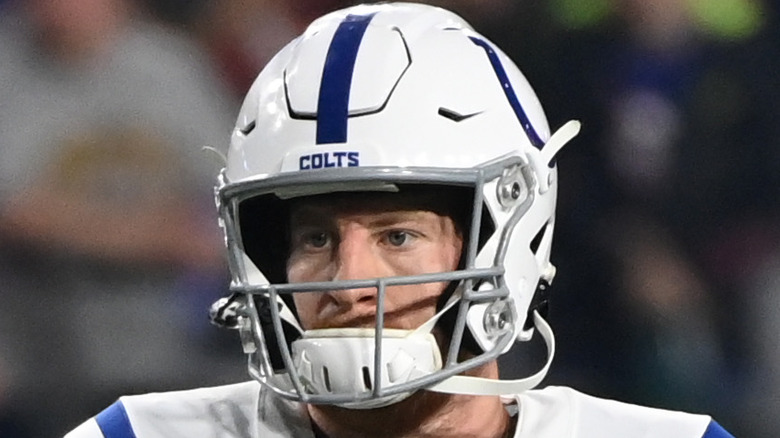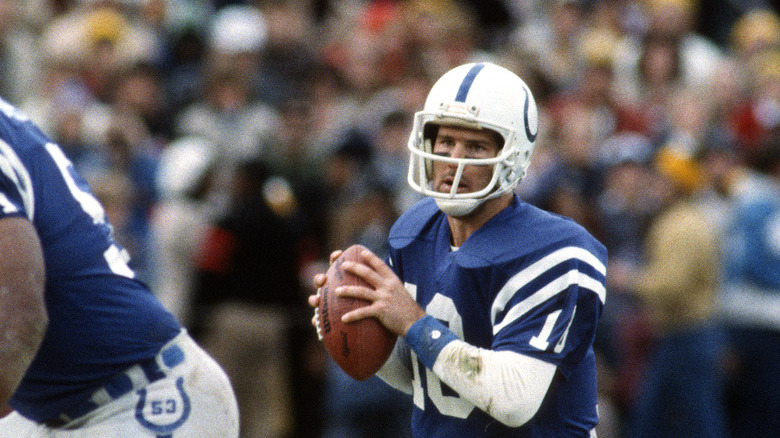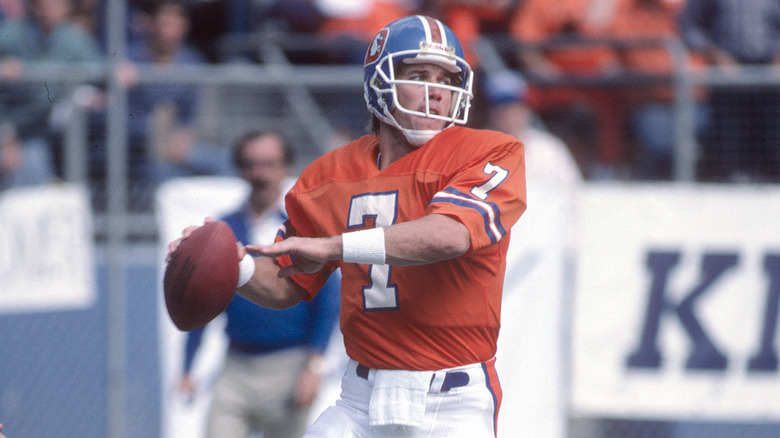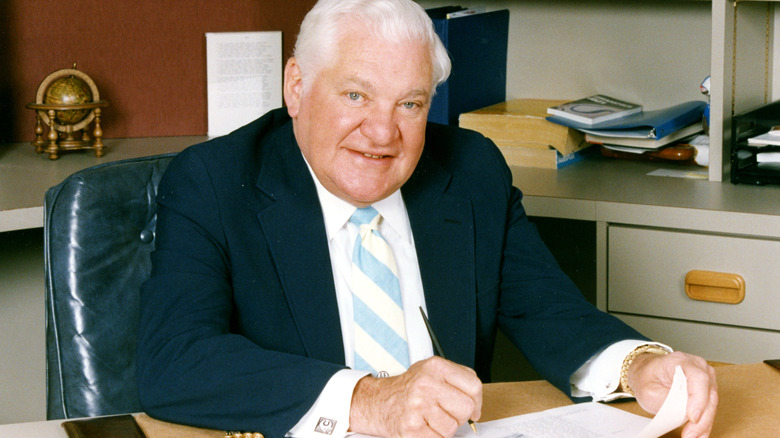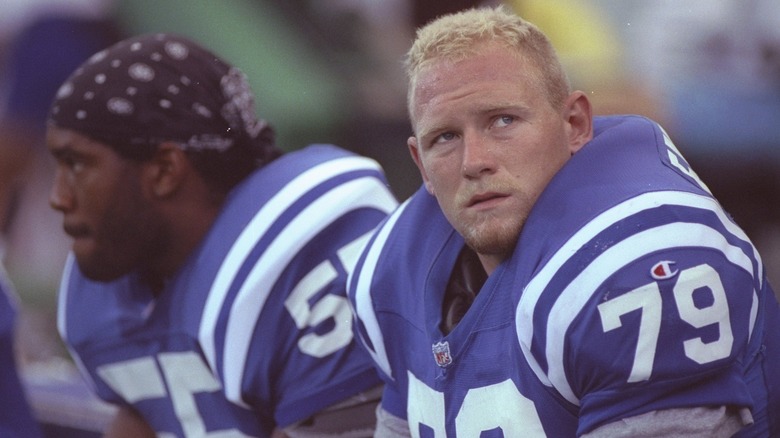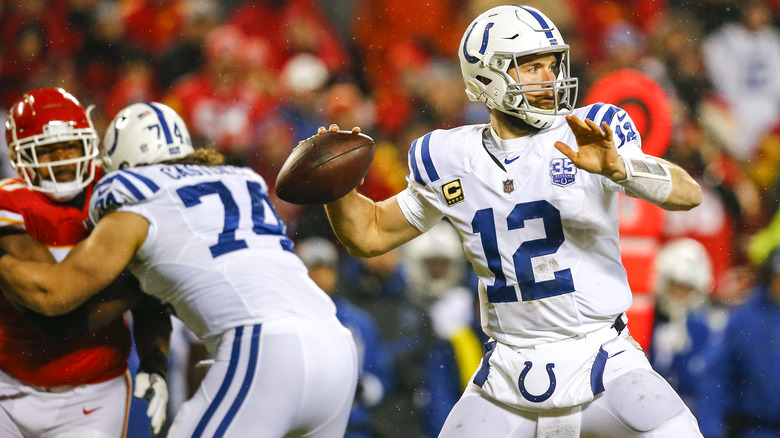Tragic History Of The Indianapolis Colts
The Indianapolis Colts have been in the NFL for close to 70 years, technically starting out in 1952 as the Dallas Texans before they moved to Baltimore and became the Colts. Prior to that, there was another Baltimore Colts that spent just one season in the NFL after the league merged with the All-America Football Conference in 1950, but it was the second Colts franchise that stuck around and went on to become a regular championship contender for much of the late 1950s and the 1960s, and later on in the 2000s. Only time will tell if today's Colts, with a resurgent Carson Wentz at quarterback and Jonathan Taylor putting up big numbers at running back, enjoy similar success going forward.
We are, however, not here to talk about the greatness of quarterbacks like Johnny Unitas and Peyton Manning. We're not here to remind you about said quarterbacks' targets at wide receiver, from Raymond Berry in the Unitas era to Marvin Harrison in the Manning era. And this isn't the time either to look back on their championship victories, of which they have quite a few. It's true that the Colts have had their share of triumphs, both in Baltimore and in Indianapolis, but they've also dealt with some tough times on and off the field, sometimes for several seasons on end.
The post-Johnny Unitas era: Bad luck, bad draft picks, bad football
As shown on their Pro Football Reference team history page, the Baltimore Colts had a great run with Johnny Unitas, winning two NFL championships in the 1950s and one Super Bowl in the early '70s — Super Bowl V, the first league championship after the NFL-AFL merger. Save for a three-year spell from 1975 to 1977 where quarterback Bert Jones and running back Lydell Mitchell led the Colts to the playoffs, the post-Unitas years were largely futile, as they consistently finished among the NFL's worst teams for most of the '70s and '80s. Bad luck did play a part in the Colts' collapse, as Jones was a legit superstar at quarterback before a string of injuries diminished his efficiency and forced him to retire in 1983 at just 32 years old (via The Washington Post).
Arguably, the Colts reached their nadir during the strike-shortened 1982 season. Ahead of the campaign, they drafted highly-regarded Ohio State quarterback Art Schlichter (pictured) fourth overall. Unfortunately, he was horrible on the field, and as IndyStar reported, his gambling problem resulted in him spending much of his adult life behind bars. When it was all over, the Colts finished 1982 with a 0-8-1 record, leaving fans wondering what Baltimore management saw in Schlichter when Jim McMahon — who'd have a successful NFL career behind center — was available just one spot later at No. 5.
This Hall of Fame QB turned them down after he was drafted No. 1 overall
The rookie quarterback class from the 1983 NFL Draft was everything the similarly-hyped 2021 rookie QB class currently isn't. Save for No. 7 pick Todd Blackledge, all the other first-round signal-callers from the 1983 class had what you could call successful pro football careers. Three of them, in fact, made it to the Hall of Fame, including the first overall pick that year, John Elway, who was selected by the Baltimore Colts.
Wait, what? Didn't Elway spend his entire NFL career with the Denver Broncos and lead them to two Super Bowl wins? Yes, you read that correctly — John Elway was drafted by the Colts in 1983, but he wasn't going to be their next franchise quarterback. As early as December 1982, the Stanford Cardinal standout was telling the Colts that he didn't want to play for them, as he preferred to "play for a team on the West Coast" or for an established powerhouse like the Dallas Cowboys or Miami Dolphins (via The New York Times). He also had a promising baseball career with the New York Yankees' farm system, and when Baltimore went ahead and selected him first overall in the 1983 NFL Draft, Elway said that "it looks like I'll be playing with the Yankees."
A week or so later, the Colts traded Elway to the Broncos and got in return the 1983 draft's fourth pick, offensive lineman Chris Hinton, as well as young quarterback prospect Mark Herrmann and Denver's first-round choice in the 1984 draft. While Hinton went on to play in seven Pro Bowls, including five with the Colts, Herrmann was a flop, throwing just one touchdown pass and nine interceptions in two seasons with the Colts.
Sneaking out of Baltimore in the middle of the night
By 1984, the Baltimore Colts had devolved into the early '80s equivalent of meme fodder. Instead of young, talented John Elway at quarterback, they had journeyman-caliber Mike Pagel, who never became a regular starter again after his stint with the Colts ended (via Pro Football Reference). And while they did improve to a 7-9 record in the 1983 season, that was still a losing record — their sixth consecutive. As noted by Forbes, attendance was also dwindling, as fans preferred to stay home than watch their hometown team get clobbered on any given Sunday. Through it all, owner Robert Irsay kept insisting that he had no plans to move the Colts to another city, despite myriad rumors suggesting otherwise.
Then, in the "cover of darkness," as many sources have since put it, Irsay loaded up 15 trucks late at night on March 28 and literally moved the Colts to Indianapolis, where they remain to this day. Just a day before this infamous event, the Maryland Senate voted to allow Baltimore to seize the Colts and prevent them from leaving. However, Irsay had other ideas, as he accepted an 11th-hour deal to move his club instead of forcibly giving it up. Supposedly, the owner was at loggerheads with Baltimore officials over improvements to the Colts' home field, the Memorial Stadium, in the lead-up to the move to Indianapolis (via History).
In an interesting case of deja vu, pro football returned to Baltimore in 1996 when Cleveland Browns owner Art Modell, also mired in a similar dispute with his team's home city, moved the team and renamed it the Ravens.
New home, same struggles, even more questionable draft picks
You can't just take a bad team to a new city and expect them to magically transform into contenders. That was indeed the case with the Indianapolis Colts after Bob Irsay's "cover of darkness/night" move, as their Pro Football Reference team page shows. Save for a couple of brief periods in which superstar running backs Eric Dickerson and Marshall Faulk revitalized the team's fortunes, the Colts kept the losing tradition going in Indy. And speaking of Faulk, he was more of the exception than the rule as one of the few early-mid-'90s first-round draft picks who actually panned out for the Colts.
In 1990, Indianapolis selected quarterback Jeff George at No. 1, and while he did have some good seasons in a 12-year NFL career, none of them were with the Colts, where he threw just 41 touchdown passes to 46 interceptions in four years. Two years later, the Colts had the rare fortune of having the first two picks in the draft and chose to upgrade their defense by using those picks on defensive end Steve Emtman and linebacker Quentin Coryatt. Neither of them lived up to the hype; the injury-prone Emtman played just 18 games in three seasons in Indy (via Yahoo Sports), while Coryatt had a decent career, but not one you'd expect from someone selected at No. 2.
Thankfully, the Colts got it right in 1998 when they chose Peyton Manning first overall — can you imagine how much worse things would've been for the then-struggling franchise had they wasted, er ... used that pick on Ryan Leaf?
Andrew Luck's shocking retirement
With the first overall selection in the 2012 NFL Draft, the Indianapolis Colts had another chance to pick a blue-chip quarterback from Stanford, and this time, he actually stuck around — but not long enough. When Andrew Luck was healthy, he certainly lived up to his draft billing. While not at the same level as Peyton Manning in terms of overall impact, Luck played in four Pro Bowls, led the NFL in touchdown passes in 2014, and won 53 out of the 86 games he started in a Colts uniform (via Pro Football Reference).
Unfortunately, Luck also dealt with various injuries, which resulted in subpar play in 2015 (15 TDs, 12 interceptions, 74.9 QB rating in just seven games) and forced him to miss the entire 2017 season. After winning the Associated Press Comeback Player of the Year award in 2018, he shocked Indianapolis fans — and NFL fans in general — when in August 2019, he announced his retirement from professional football at the very young age of 29. In a press conference (via The New York Times), Luck explained that he felt his recurring injuries had "taken the joy out of this game" and compromised his quality of life. "I'm in pain, I'm still in pain, I've been in this cycle for four years," he continued. "Shoulder, ankle, and this and this and this. I don't feel like I can live the life I want moving forward."
